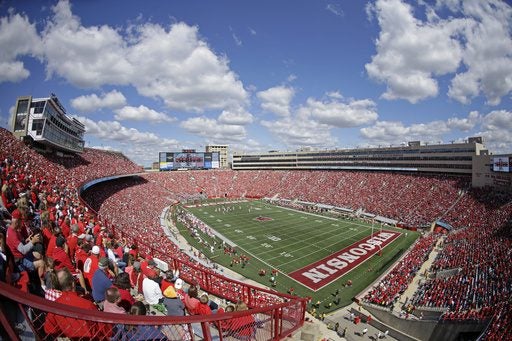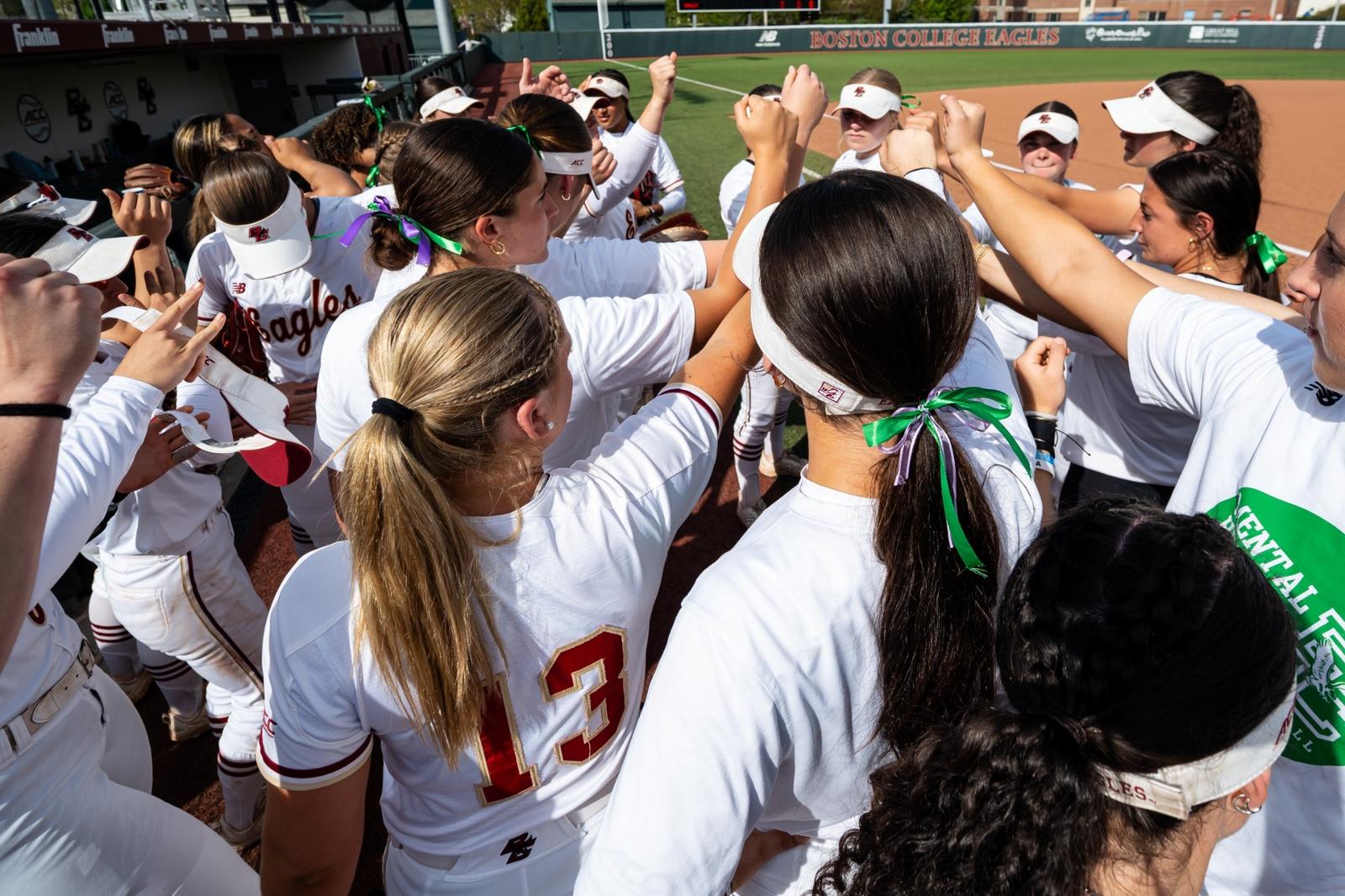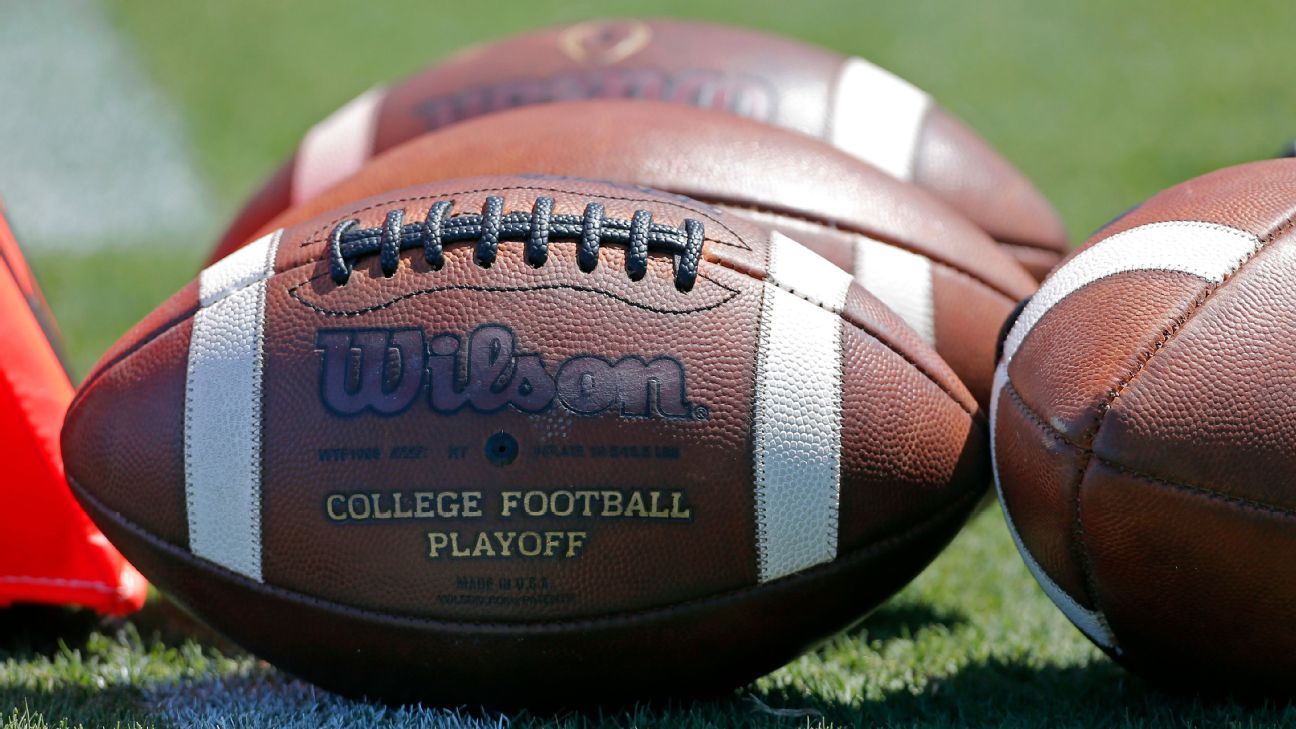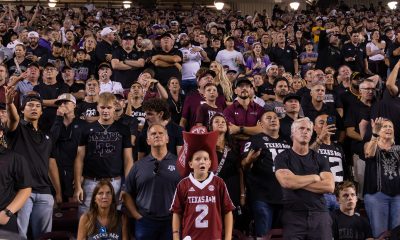NIL
Blue Jays Roundup: Avery Graves named All-State
Jun. 6—JAMESTOWN — One Blue Jay was recognized as one of the best in the state of North Dakota. Avery Graves, a junior for the Jamestown High School softball team, was named to the 2025 Class A Softball All-State Team on Friday. Advertisement Graves, the starting first baseman, posted a batting average of .449 and […]

Jun. 6—JAMESTOWN — One Blue Jay was recognized as one of the best in the state of North Dakota.
Avery Graves, a junior for the Jamestown High School softball team, was named to the 2025 Class A Softball All-State Team on Friday.
Advertisement
Graves, the starting first baseman, posted a batting average of .449 and a slugging percentage of .692 this season. The senior produced 48 hits — 32 singles, 11 doubles and five home runs. The junior recorded 48 RBIs.
2025 Class A Softball All-State Team
Avery Graves, Jamestown
Halle Baker, Minot
Madison Aadland, West Fargo Sheyenne
Jocelyn Berg, Grand Forks Red River
Riley Ingemansen, Legacy
Rylee Irgens, Williston
Mya Jones, Bismarck High
Katelyn Kackman, West Fargo
Olivia Kalbus, Fargo North
Aubrey King, Fargo North
Mackenna Medina, Dickinson
Jada Purdy, Fargo North
Sophia Rerick, Fargo Davies
Cadey Shipman, Minot North
Advertisement
Gabi Sobolik, Dickinson
Brooklyn Soderberg, Grand Forks Red River
Presley Tveter, West Fargo Sheyenne
Kaebry Weekes, Mandan
Ali Wilcox, Williston
NDHSCA POWERade Outstanding Senior Athlete — Aubrey King, Fargo North
NDHSCA SUBWAY Coach of the Year — Jesse Stundal, Williston
NIL
More On Hoops Star Saniyah Hall’s NIL Deal with Jordan Brand As She Joins The USA U19 National Team
Saniyah Hall, the No. 1 overall girls basketball prospect in the Class of 2026, has officially signed a Name, Image and Likeness (NIL) deal with Jordan Brand making her one of the youngest athletes ever to join the iconic basketball label’s growing NIL roster. The announcement was made via a joint Instagram collaboration post between […]

Saniyah Hall, the No. 1 overall girls basketball prospect in the Class of 2026, has officially signed a Name, Image and Likeness (NIL) deal with Jordan Brand making her one of the youngest athletes ever to join the iconic basketball label’s growing NIL roster.
The announcement was made via a joint Instagram collaboration post between Hall and the brand, featuring a simple but powerful quote from the rising star:
“I don’t have anything to prove. I just go out, play basketball,” said Hall. “I let my game do the talking. Actions speak for themselves.”
Jordan Brand praised Hall for it described as fearless play, an elite skill set, and a growing cultural influence.
“Saniyah Hall’s fearless play and undeniable presence on and off the court reflect the greatness Jordan Brand stands for,” the brand shared in a statement. “Her signing signals the arrival of a new era, led by athletes who don’t just play the game — they elevate it.”
Hall stars for Montverde Academy (Fla.), the storied powerhouse that has produced NBA top picks like Cooper Flagg, Cade Cunningham, Ben Simmons, and D’Angelo Russell. As a junior, Hall averaged 20.3 points and 6.7 rebounds per game, drawing offers from college juggernauts including USC, South Carolina, North Carolina, Ohio State, and Michigan State.
She’s known for her scoring versatility, physical toughness, and a game that continues to mature with every season.
Before she makes her college decision, Hall will don the red, white and blue as part of USA Basketball’s roster for the 2025 FIBA U19 Women’s World Cup in the Czech Republic. She’ll team up with fellow elite recruits like Sienna Betts, Jasmine Davidson, Kate Harpring, and Jerzy Robinson.
Her selection is a testament not only to her talent but to her growing leadership on the international stage.
Jordan Brand’s decision to sign Hall reflects a growing investment in women’s basketball at all levels. Hall follows in the footsteps of UCLA’s Kiki Rice, the brand’s first NIL signee, and joins a new wave of high school and college players backed by the Jumpman.
Nike and Jordan Brand have increasingly tailored performance models for women, such as the Jordan Heir, their first basketball shoe designed with female athletes in mind. Meanwhile, Nike has made waves with signature lines for Sabrina Ionescu and A’ja Wilson, and speculation continues around future signature models for Caitlin Clark and Juju Watkins.
While Hall’s college decision remains open, one thing is clear: her future is bright. With elite production at Montverde, a global stage awaiting at the FIBA World Cup, and the backing of Jordan Brand, she’s poised to become one of the most influential young stars in the sport.
NIL
The new college sports agency is rejecting some athlete NIL deals with donor-backed collectives
The new agency in charge of regulating name, image, likeness deals in college sports sent a letter to schools Thursday saying it had rejected deals between players and donor-backed collectives formed over the past several years to funnel money to athletes or their schools. Those arrangements hold no “valid business purpose,” the memo said, and […]

The new agency in charge of regulating name, image, likeness deals in college sports sent a letter to schools Thursday saying it had rejected deals between players and donor-backed collectives formed over the past several years to funnel money to athletes or their schools.
Those arrangements hold no “valid business purpose,” the memo said, and don’t adhere to rules that call for outside NIL deals to be between players and companies that provide goods or services to the general public for profit.
The letter to Division I athletic directors could be the next step in shuttering today’s version of the collective, groups that are closely affiliated with schools and that, in the early days of NIL after July 2021, proved the most efficient way for schools to indirectly cut deals with players.
Since then, the landscape has changed yet again with the $2.8 billion House settlement that allows schools to pay the players directly as of July 1.
Already, collectives affiliated with Colorado, Alabama, Notre Dame, Georgia and others have announced they’re shutting down. Georgia, Ohio State and Illinois are among those that have announced plans with Learfield, a media and technology company with decades of licensing and other experience across college athletics, to help arrange NIL deals.
Outside deals between athlete and sponsor are still permitted, but any worth $600 or more have to be vetted by a clearinghouse called NIL Go that was established by the new College Sports Commission.
In its letter to the ADs, the CSC said more than 1,500 deals have been cleared since NIL Go launched on June 11, “ranging in value from three figures to seven figures.” More than 12,000 athletes and 1,100 institutional users have registered to use the system.
But the bulk of the letter explained that many deals could not be cleared because they did not conform to an NCAA rule that sets a “valid business purpose” standard for deals to be approved.
The letter explained that if a collective reaches a deal with an athlete to appear on behalf of the collective, which charges an admission fee, the standard is not met because the purpose of the event is to raise money to pay athletes, not to provide goods or services available to the general public for profit.
The same would apply to a deal an athlete makes to sell merchandise to raise money to pay that player because the purpose of “selling merchandise is to raise money to pay that student-athlete and potentially other student-athletes at a particular school or schools, which is not a valid business purpose” according to the NCAA rule.
A deal, however, could be approved if, for instance, the businesses paying the players had a broader purpose than simply acting as a collective. The letter uses a golf course or apparel company as examples.
“In other words, NIL collectives may act as marketing agencies that match student-athletes with businesses that have a valid business purpose and seek to use the student’s NIL to promote their businesses,” the letter said.
___
AP college sports: https://apnews.com/hub/college-sports
NIL
The new college sports agency is rejecting some athlete NIL deals with donor-backed collectives
The new agency in charge of regulating name, image, likeness deals in college sports sent a letter to schools Thursday saying it had rejected deals between players and donor-backed collectives formed over the past several years to funnel money to athletes or their schools. Those arrangements hold no “valid business purpose,” the memo said, and […]

The new agency in charge of regulating name, image, likeness deals in college sports sent a letter to schools Thursday saying it had rejected deals between players and donor-backed collectives formed over the past several years to funnel money to athletes or their schools.
Those arrangements hold no “valid business purpose,” the memo said, and don’t adhere to rules that call for outside NIL deals to be between players and companies that provide goods or services to the general public for profit.
The letter to Division I athletic directors could be the next step in shuttering today’s version of the collective, groups that are closely affiliated with schools and that, in the early days of NIL after July 2021, proved the most efficient way for schools to indirectly cut deals with players.
Since then, the landscape has changed yet again with the $2.8 billion House settlement that allows schools to pay the players directly as of July 1.
Already, collectives affiliated with Colorado, Alabama, Notre Dame, Georgia and others have announced they’re shutting down. Georgia, Ohio State and Illinois are among those that have announced plans with Learfield, a media and technology company with decades of licensing and other experience across college athletics, to help arrange NIL deals.
Outside deals between athlete and sponsor are still permitted, but any worth $600 or more have to be vetted by a clearinghouse called NIL Go that was established by the new College Sports Commission.
In its letter to the ADs, the CSC said more than 1,500 deals have been cleared since NIL Go launched on June 11, “ranging in value from three figures to seven figures.” More than 12,000 athletes and 1,100 institutional users have registered to use the system.
But the bulk of the letter explained that many deals could not be cleared because they did not conform to an NCAA rule that sets a “valid business purpose” standard for deals to be approved.
The letter explained that if a collective reaches a deal with an athlete to appear on behalf of the collective, which charges an admission fee, the standard is not met because the purpose of the event is to raise money to pay athletes, not to provide goods or services available to the general public for profit.
The same would apply to a deal an athlete makes to sell merchandise to raise money to pay that player because the purpose of “selling merchandise is to raise money to pay that student-athlete and potentially other student-athletes at a particular school or schools, which is not a valid business purpose” according to the NCAA rule.
A deal, however, could be approved if, for instance, the businesses paying the players had a broader purpose than simply acting as a collective. The letter uses a golf course or apparel company as examples.
“In other words, NIL collectives may act as marketing agencies that match student-athletes with businesses that have a valid business purpose and seek to use the student’s NIL to promote their businesses,” the letter said.
___
AP college sports: https://apnews.com/hub/college-sports
Copyright 2025 The Associated Press. All rights reserved. This material may not be published, broadcast, rewritten or redistributed without permission.
NIL
How NIL has changed college basketball: Numbers deep dive reveals surprising trends, recipe for success
The NIL era, starting July 1, 2021, has drastically altered college basketball’s competitive landscape. Iconic programs like Gonzaga and Kansas continue to perform well, but others have struggled, revealing a widening disparity in success rates. Of note, 11 teams have achieved a winning percentage of 75% or more in just four seasons — a significant […]

The NIL era, starting July 1, 2021, has drastically altered college basketball’s competitive landscape. Iconic programs like Gonzaga and Kansas continue to perform well, but others have struggled, revealing a widening disparity in success rates. Of note, 11 teams have achieved a winning percentage of 75% or more in just four seasons — a significant increase from previous decades. Meanwhile, mid-major programs are experiencing an increase in prominence, further complicating the traditional hierarchy of college basketball.
By the Numbers
- From 2000-21, only 4 teams recorded a winning percentage of 75% or higher; since NIL, 11 teams have achieved this in just 4 seasons.
- Houston leads with an 86.8% winning percentage since NIL, followed by Duke at 80.7% and Gonzaga at 80.6%.
Yes, But
While many teams have surged in the NIL era, some programs have seen their success decline dramatically, underscoring the uneven distribution of resources and talent across conferences.
State of Play
- Non-major conference teams like Drake and Saint Mary’s are experiencing unprecedented success, with winning percentages above 75%.
- Some traditional powerhouses, like North Carolina and Kansas, have also declined in performance relative to the new era.
What’s Next
Expect ongoing shifts in college basketball dynamics as more mid-major programs leverage NIL opportunities to compete with traditional powerhouses, potentially reshaping the landscape in the coming years.
Bottom Line
The NIL era has expanded opportunities for success but has also intensified competition, suggesting that ongoing adjustments will be essential for programs to navigate this new reality effectively.
NIL
Eight Eagles Named to All-ACC Academic Softball Team
CHESTNUT HILL, Mass. – Eight Eagles for Boston College softball were named to the All-ACC Academic Team on Thursday. Kalista Case, Katelyn Deguire, Janis Espinoza, Bailey Kendziorski, Meghan Schouten, Makenna Segal, Hannah Slike, and Jordan Stephens were recognized for their excellence on the field and in the classroom. For Hannah Slike, it marked the […]

Kalista Case, Katelyn Deguire, Janis Espinoza, Bailey Kendziorski, Meghan Schouten, Makenna Segal, Hannah Slike, and Jordan Stephens were recognized for their excellence on the field and in the classroom.
For Hannah Slike, it marked the fourth time she earned All-ACC Academic honors, while Mekenna Segal and Jordan Stephens received their second All-Academic award.
2025 ACC All-Academic Team
Kalista Case
Katelyn Deguire
Janis Espinoza
Bailey Kendziorski
Meghan Schouten
Makenna Segal**
Hannah Slike ****
Jordan Stephens**
The 2025 All-ACC Academic Team features 176 student-athletes from each of the league’s 15 softball programs. Florida State led all schools with 17 honorees on the 2025 All-ACC Academic Team.
Academic requirements for selection to the All-ACC Academic Team are a 3.0 grade point average for the previous semester and a 3.0 cumulative average during one’s educational career. Additionally, student-athletes must participate in at least 50 percent of their team’s contests.
NIL
College Sports Commission clarifies ‘valid business purpose’ for NIL Deals
Jul 10, 2025, 04:11 PM ET The new agency in charge of regulating name, image, likeness deals in college sports sent a letter to schools Thursday saying it had rejected deals between players and donor-backed collectives formed over the past several years to funnel money to athletes or their schools. Those arrangements hold no “valid […]

The new agency in charge of regulating name, image, likeness deals in college sports sent a letter to schools Thursday saying it had rejected deals between players and donor-backed collectives formed over the past several years to funnel money to athletes or their schools.
Those arrangements hold no “valid business purpose,” the memo said, and don’t adhere to rules that call for outside NIL deals to be between players and companies that provide goods or services to the general public for profit.
The letter to Division I athletic directors could be the next step in shuttering today’s version of the collective, groups that are closely affiliated with schools and that, in the early days of NIL after July 2021, proved the most efficient way for schools to indirectly cut deals with players.
Since then, the landscape has changed yet again with the $2.8 billion House settlement that allows schools to pay the players directly as of July 1.
Already, collectives affiliated with Colorado, Alabama, Notre Dame, Georgia and others have announced they’re shutting down. Georgia, Ohio State and Illinois are among those that have announced plans with Learfield, a media and technology company with decades of licensing and other experience across college athletics, to help arrange NIL deals.
Outside deals between athlete and sponsor are still permitted, but any worth $600 or more have to be vetted by a clearinghouse called NIL Go that was established by the new College Sports Commission.
In its letter to the ADs, the CSC said more than 1,500 deals have been cleared since NIL Go launched on June 11, “ranging in value from three figures to seven figures.” More than 12,000 athletes and 1,100 institutional users have registered to use the system.
But the bulk of the letter explained that many deals could not be cleared because they did not conform to an NCAA rule that sets a “valid business purpose” standard for deals to be approved.
The letter explained that if a collective reaches a deal with an athlete to appear on behalf of the collective, which charges an admission fee, the standard is not met because the purpose of the event is to raise money to pay athletes, not to provide goods or services available to the general public for profit.
The same would apply to a deal an athlete makes to sell merchandise to raise money to pay that player because the purpose of “selling merchandise is to raise money to pay that student-athlete and potentially other student-athletes at a particular school or schools, which is not a valid business purpose” according to the NCAA rule.
A deal, however, could be approved if, for instance, the businesses paying the players had a broader purpose than simply acting as a collective. The letter uses a golf course or apparel company as examples.
“In other words, NIL collectives may act as marketing agencies that match student-athletes with businesses that have a valid business purpose and seek to use the student’s NIL to promote their businesses,” the letter said.
-

 Technology2 weeks ago
Technology2 weeks agoPet fitness and wellness trends for a healthier and happier dog
-

 College Sports2 weeks ago
College Sports2 weeks agoWAC to Rebrand to UAC, Add Five New Members in 2026
-
College Sports3 weeks ago
Women's Basketball Thanks Shannon LeBeauf for 14 Seasons
-

 Motorsports1 week ago
Motorsports1 week agoWhy Cosmetics are Making Up for Lost Time in Women’s Sports
-

 Professional Sports3 weeks ago
Professional Sports3 weeks agoAlex Pereira responds to rumors of UFC heavyweight title fight with threatening message
-

 Professional Sports3 weeks ago
Professional Sports3 weeks agoFrancis Ngannou sends Dana White a message following Jon Jones' shock UFC retirement
-

 College Sports3 weeks ago
College Sports3 weeks agoAlabama Basketball
-

 College Sports2 weeks ago
College Sports2 weeks agoA new era of Dickinson hockey begins behind the bench – The Dickinson Press
-

 Motorsports2 weeks ago
Motorsports2 weeks agoNASCAR This Week – Patriot Publishing LLC
-

 Sports3 weeks ago
Sports3 weeks agoSEC Conference imposing a fine will create the opposite effect.






























